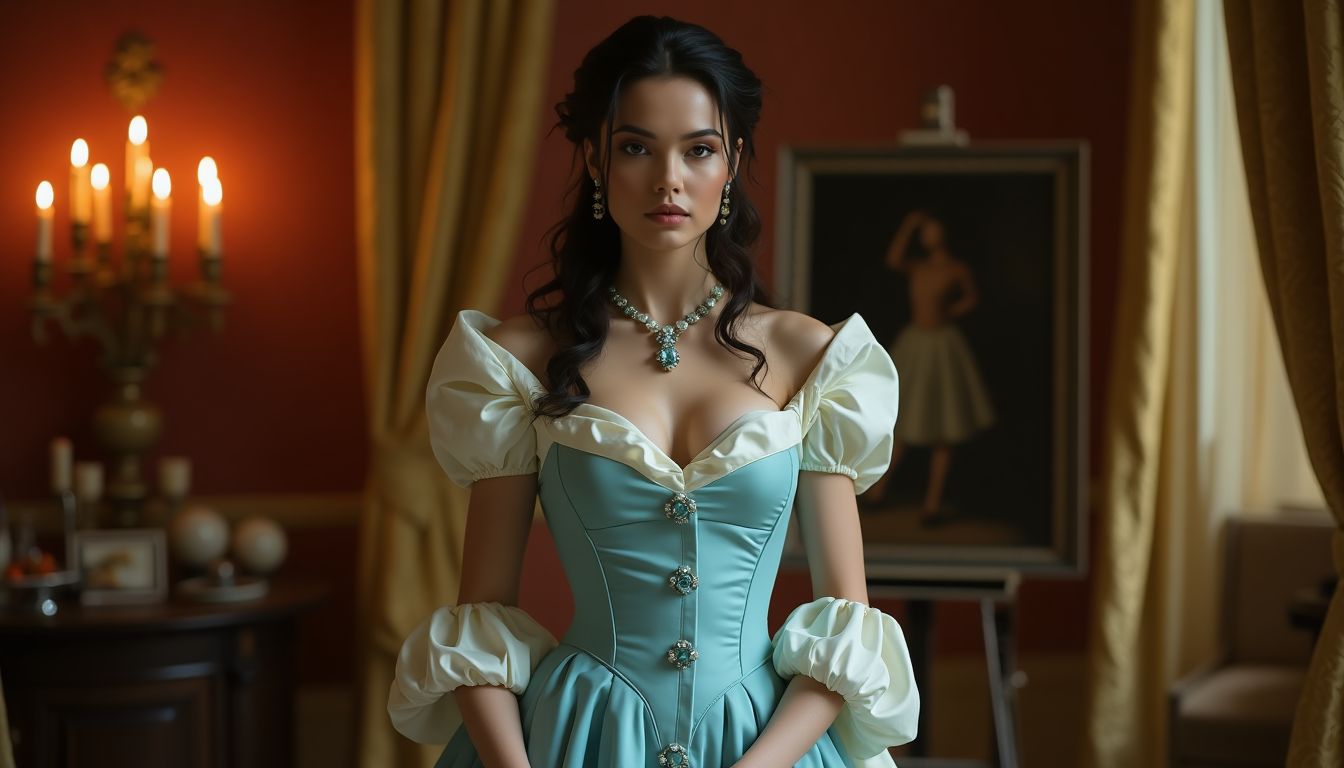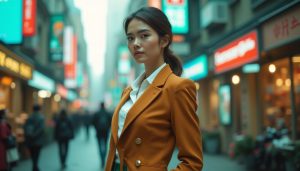The plaza was alive with the bustle of carriages, merchants, and citizens weaving through cobblestone streets under the shadow of Florence’s imposing Duomo. The banners of the Medici family fluttered above the city, their crimson and gold shimmering under the winter’s pale sunlight. In the midst of this vibrant chaos stood Livia Accorsi, a woman whose presence stilled the air as if she commanded more than the space around her. The powder blue hue of her gown caught the eyes of passersby; a garment so modern it dared to defy the contours of Renaissance fashion.
The gown was an avant-garde marvel of its time. Its powder blue fabric, sharp yet flowing, cascaded down in structured folds rather than the traditional heavy drapes of velvet or brocade. The bodice was masterfully tailored, forming a double-breasted design not unlike a man’s jerkin, but softened by an overlap of silk panels that hinted at both power and femininity. The high collar of cream lace beneath resembled the rolling necklines of the time, but it was far more unassuming, far warmer, its texture adding a rare understated elegance. The structured sleeves gathered at the elbow with pearl-studded brooches, letting loose waves of fabric suggest the motion of the Arno River itself. Her high-waisted belt cinched tightly, adorned with delicate medallions enameled in gold, declaring her wealth yet also her independence in a culture that too often stifled such displays.
Above all, it was Livia’s composure that commanded attention. Her dark hair curled and fell loosely yet deliberately, framing her angular face, though few dared to look at her too long. Her eyes—always cool, calculating—seemed to see directly into the souls of those too preoccupied to wonder why she had chosen to walk Florence’s streets dressed as no other woman dared.
She carried a small, structured handbag—an almost baffling investment in a culture accustomed to extravagant satchels. It was punctuated with a gilded chain and bore the crest of Venice’s finest leather craftsmen, a subtle nod to her travels and connections. Around her neck, the faintest shimmer of an aquamarine pendant could be seen, its hues mirroring those of her gown and offsetting the ivory sheen of her skin.
“Signorina Accorsi,” a voice rasped behind her, and she stopped mid-step, fingers tightening on the edge of the handbag while her gaze did not waver. “Word has reached me of your latest… design. The merchants speak of its peculiarity.”
She turned, her turtleneck-like collar shielding her throat as much as it granted her an air of mystery. There stood Lorenzo Fabbri, his plum-colored robe brushing the frosted ground as the accusing smirk on his thin lips stretched wider. A prominent merchant, ruthless in his dealings, his voice carried a weight that made most cower.
“Peculiarity,” Livia repeated, smoothly, lifting her chin. “How charming that word can sound when spoken with admiration. But here you wield it as a cudgel, Signore. Shall I give you my thanks for the attention you lend me?” Her tone was smooth, yet sharp—a blade crafted of words with a lethality few had yet to match.
“Attention or concern,” he countered, stepping closer. “A woman presenting herself like… this challenges Florence’s traditions, its dignity.” He motioned toward her gown and the poised way she wore it. “Do you wish to see yourself chased from the courts the way whispers would chase scandals from the sanctity of the church?”
The air between them grew taut. Livia’s lips curved, not quite a smile, but the suggestion of one. “Perhaps the sacredness of tradition lies not in its rigidity but the ways it adapts to the times. My work does not offend Florence—it elevates it.” Her voice hushed but no less confident. “Tradition does not crumble when touched by something new; it becomes timeless.”
Fabbri frowned, the furrow of his brow quicksilver with uncertainty. Before he could reply, Livia turned and began walking again, each step radiating an authority not bestowed by rank or privilege, but squarely from her own defiance. The plaza once again seemed immersed by the spectacle of her—a silhouette of powder blue against Florence’s earthen backdrop, more vivid than a painter’s canvas and far more alive.
In the crowd nearby, a younger woman tugged at her mother’s sleeve, pointing toward Livia’s departing figure. “Do you think she’s wrong, mama? To wear men’s cloth against the rules?”
The mother hesitated, watching Livia vanish into the sunlight. “Maybe,” she said. “But wrong or not, she is first. And firsts are remembered.”
Far beyond the bustling square, Livia reached the Palazzo Vecchio, slipping into an alcove rich with shadows. There, waiting for her, was Dante, a painter with hair tousled like the autumn wind and a smile that carried storms. A delicate easel sat beside him, its canvas covered in ochre strokes, mid-creation. Livia sighed as she let the tension of Lorenzo Fabbri’s venom slip away. “The world hates what it cannot define,” she murmured, fingering the aquamarine pendant at her collarbone. “But we will make it see. Through ink and color, they will remember us both.”
“Not just remember,” Dante said, brushing a fleck of pigment against the canvas. “Adore.”
The night descended swiftly over Florence, shadows swallowing the palazzo towers one by one. But Livia knew the city would never forget the defiance that cut through its fog. Powder blue. Sharp and unyielding. An icon of change.
The Source…check out the great article that inspired this amazing short story: Powder Blue Dreams: A Tale of Tailoring, Confidence & Unexpected Elegance
Disclaimer: This article may contain affiliate links. If you click on these links and make a purchase, we may receive a commission at no additional cost to you. Our recommendations and reviews are always independent and objective, aiming to provide you with the best information and resources.




















Post Comment